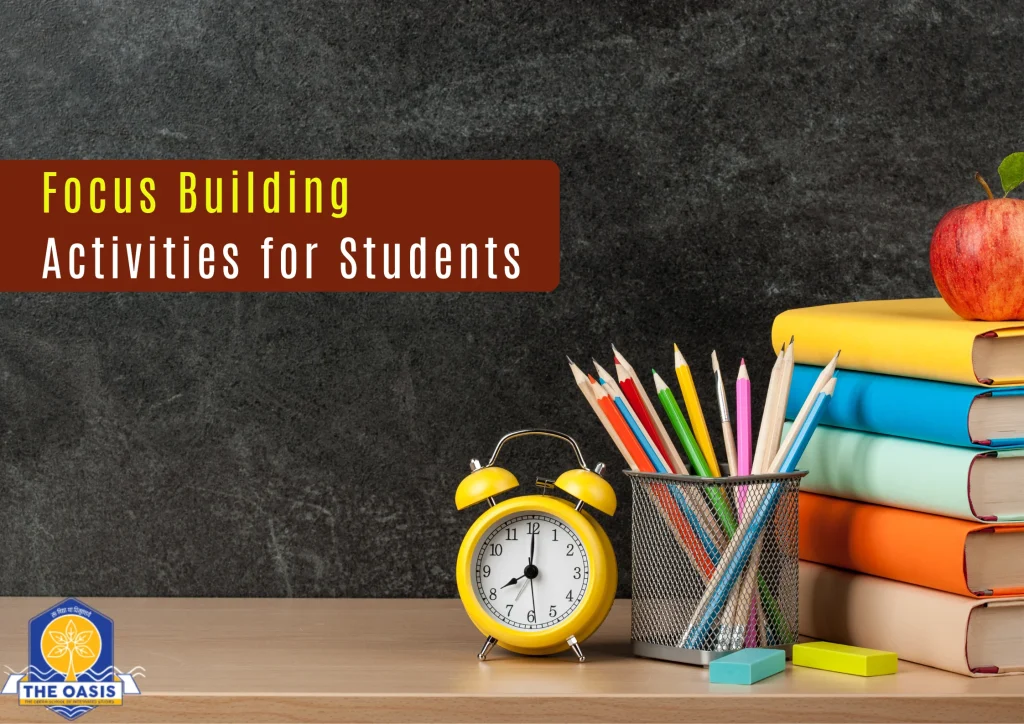 In today’s fast-paced world filled with distractions, Focus Building is an essential skill for students to develop. Whether in academics or extracurricular activities, improving concentration can significantly enhance learning outcomes.
Many educational institutions, including Best Boys Boarding Schools in India, emphasize focus building activities to help students excel in their studies and personal development.
Developing concentration takes practice, discipline, and the right set of techniques. This article explores effective Focus Building activities that can help students sharpen their attention and achieve academic success.
In today’s fast-paced world filled with distractions, Focus Building is an essential skill for students to develop. Whether in academics or extracurricular activities, improving concentration can significantly enhance learning outcomes.
Many educational institutions, including Best Boys Boarding Schools in India, emphasize focus building activities to help students excel in their studies and personal development.
Developing concentration takes practice, discipline, and the right set of techniques. This article explores effective Focus Building activities that can help students sharpen their attention and achieve academic success.
Why is Focus Building Important for Students?
 Maintaining concentration is crucial for students as it allows them to:
Maintaining concentration is crucial for students as it allows them to:
- Improve comprehension and retain information effectively.
- Enhance problem-solving and decision-making abilities.
- Manage time efficiently and complete tasks faster.
- Reduce stress and improve overall academic performance.
- Develop discipline and patience for long-term success.
Focus Building plays a significant role in a student’s learning journey, helping them develop habits that contribute to lifelong success.
Effective Focus Building Activities for Students:

1. Mindfulness and Meditation
Practicing mindfulness and meditation helps students stay present in the moment, reducing mental clutter and distractions.
Simple mindfulness exercises include:
- Deep breathing for 5–10 minutes before studying.
- Guided meditation sessions to calm the mind.
- Visualization techniques to enhance focus on specific tasks.
2. Pomodoro Technique
The Pomodoro Technique is a proven time management strategy that improves concentration.
It involves:
- Studying for 25-minute intervals (Pomodoro) followed by a 5-minute break.
- Taking a longer break after completing four Pomodoro.
- Using a timer to maintain discipline and track progress.
3. Reading Aloud
Reading aloud increases comprehension and helps students focus better on the text. This method is particularly useful for retaining complex concepts and improving pronunciation skills.
4. Playing Focus Building Games
Certain games help in strengthening concentration skills, such as:
- Chess, Sudoku, and Crossword Puzzles.
- Memory card games and matching games.
- Brain-training apps like Lumosity and Elevate.
5. Journaling and Writing Exercises
Encouraging students to maintain a journal or write essays regularly can enhance their ability to focus and articulate their thoughts effectively.
Daily writing helps in:
- Organizing ideas clearly.
- Reducing distractions by engaging in structured thinking.
- Strengthening memory retention.
6. Exercise and Physical Activities
Regular physical activity has a direct impact on mental alertness and focus.
Activities that help include:
- Yoga and stretching exercises.
- Aerobic workouts such as running and cycling.
- Sports like basketball, football, or badminton that require strategy and attention.
7. Creating a Distraction-Free Study Environment
Students should ensure they have an environment conducive to focused learning.
This includes:
- Keeping mobile phones and social media distractions away.
- Organizing study materials before starting work.
- Using noise-canceling headphones or soft background music to minimize disturbances.
8. Practicing Active Listening
Active listening is an excellent Focus Building activity that helps students stay engaged during lectures or discussions.
It involves:
- Taking notes while listening to improve retention.
- Summarizing key points after a lecture.
- Asking questions to clarify concepts and stay involved.
9. Structured Study Routine
Creating a well-planned study schedule ensures that students develop a habit of focus.
A good study routine should include:
- Fixed time slots for studying each subject.
- Short breaks to avoid fatigue and maintain concentration.
- Time for revision and practice to reinforce learning.
10. Practicing Deep Work
Deep work refers to intense focus on one task without interruptions.
To achieve deep work:
- Set specific goals before starting a task.
- Work in time blocks without multitasking.
- Gradually increase the duration of deep work sessions.
11. Limiting Screen Time
Excessive use of digital devices can hinder focus. To prevent digital distractions:
- Use apps that block notifications and limit screen time.
- Follow the 20-20-20 rule (take a 20-second break every 20 minutes and look 20 feet away).
- Read printed materials instead of screens whenever possible.
12. Practicing Visualization Techniques
Visualization helps students improve concentration and goal-setting skills.
Steps include:
- Imagining the successful completion of a task before starting.
- Creating a mental picture of key study topics to aid memory.
- Using visual mnemonics to recall information easily.
13. Listening to Classical Music or White Noise
Soft instrumental music or white noise can improve focus by creating a calming study atmosphere. Research suggests that classical music boosts cognitive function and enhances concentration levels.
14. Engaging in Creative Activities
Creativity fosters attention and mindfulness. Encouraging students to engage in:
- Drawing, painting, or crafting.
- Playing musical instruments.
- Solving puzzles and riddles that require attention to detail.
How Schools Can Support Focus Building:
 Educational institutions play a critical role in improving students’ concentration levels.
Schools can:
Educational institutions play a critical role in improving students’ concentration levels.
Schools can:
- Incorporate focus-building activities in daily learning schedules.
- Provide students with dedicated spaces for quiet study and meditation.
- Encourage participation in sports and extracurricular activities.
- Teach students time management strategies and goal-setting techniques.
- Organize workshops on stress management and mindfulness.
By integrating Focus Building activities into students’ routines, they can develop better attention spans, reduce distractions, and improve overall academic performance. Building focus is not just about working harder but working smarter with the right strategies.
Frequently Asked Questions (FAQs)
Ques 1. Why is Focus Building important for students?
Ans. It helps students improve academic performance, problem-solving skills, and time management.
Ques 2. Can physical activity help in Focus Building?
Ans. Yes, exercise boosts brain function, reduces stress, and improves concentration levels.
Ques 3. What role do schools play in Focus Building?
Ans. Schools integrate structured study routines, mindfulness sessions, and interactive learning to improve focus.
Ques 4. Can listening to music improve focus?
Ans. Yes, instrumental music or white noise can help create a distraction-free study environment.
Ques 5. Is the Pomodoro Technique effective for students?
Ans. Yes, it helps students stay productive by breaking tasks into manageable time intervals.
 In today’s fast-paced world filled with distractions, Focus Building is an essential skill for students to develop. Whether in academics or extracurricular activities, improving concentration can significantly enhance learning outcomes.
Many educational institutions, including Best Boys Boarding Schools in India, emphasize focus building activities to help students excel in their studies and personal development.
Developing concentration takes practice, discipline, and the right set of techniques. This article explores effective Focus Building activities that can help students sharpen their attention and achieve academic success.
In today’s fast-paced world filled with distractions, Focus Building is an essential skill for students to develop. Whether in academics or extracurricular activities, improving concentration can significantly enhance learning outcomes.
Many educational institutions, including Best Boys Boarding Schools in India, emphasize focus building activities to help students excel in their studies and personal development.
Developing concentration takes practice, discipline, and the right set of techniques. This article explores effective Focus Building activities that can help students sharpen their attention and achieve academic success.
 Maintaining concentration is crucial for students as it allows them to:
Maintaining concentration is crucial for students as it allows them to:

 Educational institutions play a critical role in improving students’ concentration levels.
Schools can:
Educational institutions play a critical role in improving students’ concentration levels.
Schools can:



